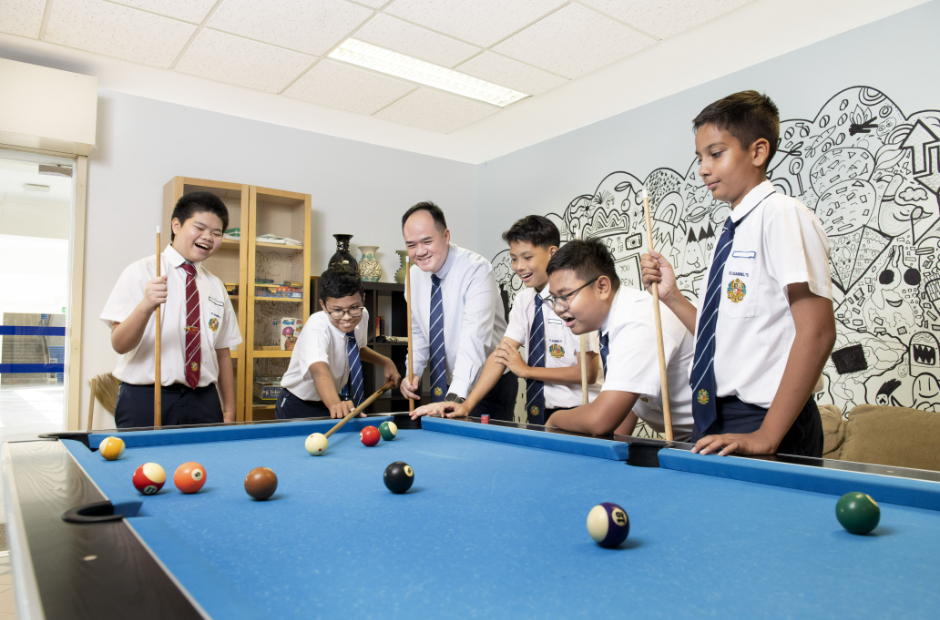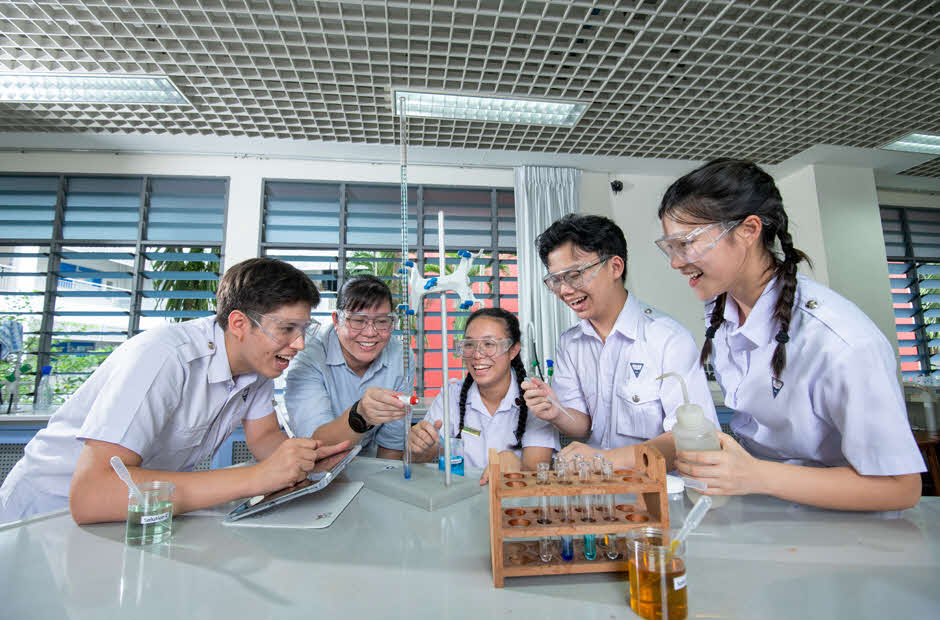Every morning, Mr Poh Wei Beng waits at the school’s side gate, ready to welcome students with a smile.
Many fist bumps and high-fives between them later, an atmosphere of warmth and enthusiasm sets a positive tone for the day ahead.
Seeing a familiar face at the gate every morning also makes the students feel safe, says Mr Poh. He is the Head of Student Management at St Gabriel’s Secondary School, who routinely reaches school at 6.15am when the skies are still dark: “It’s like a little boost of comfort and security for them.”
Emphasising the why behind the rules
Mr Poh’s ideas about student discipline are not too different from how he teaches Maths: It’s about motivating through reasoning and a light touch.
“When it comes to discipline, it is crucial to strike a balance, where rules and regulations are upheld without making students feel stifled,” he says. “To do this, I need to inculcate discipline from an angle of why it is important to follow rules.”
Students at St Gabriel’s have come to respect him as someone who is calm but firm, and who talks, not shouts. “I seek to build connections and relationships with my students. I believe that it is important to connect before you correct,” he says.
When something goes wrong, he sits with the student for a talk and asks reflective questions such as ‘How do you think your actions affect others?’, or ‘What can you do differently next time?’. While it may be easy to mete out consequences, there is also a need to explain why their actions are deemed inappropriate or wrong.

And then there is Pythagoras Poh
Making those precious connections makes a difference in his Maths classes too.
He gets the boisterous boys to start each lesson by proclaiming “I Love Maths!”, to shove any negativity for the subject aside and welcome joy into their learning.
He may bring in the history of Maths, throw in an origami session (good for learning angles), or motivate them with stories of how their schoolmates who used to be weak at Maths had obtained distinctions through hard work.
Sometimes, values like responsibility and resilience, as well as higher-order skills, are worked into the lessons. “Learning Mathematics is more than just getting good grades; it’s the process of continuous learning and striving to improve ourselves,” he dispenses in wise tones.
“I encourage students who are strong and passionate in Mathematics to do independent research to develop their creative and critical thinking.” In the past, he had also mentored students for the Singapore Mathematics Project Festival and the Innovation Programme organised by the MOE. “Many of these students have gone on to further their studies in mathematics-related fields,” he shares happily.
His students like his brand of care, affectionately calling him Mr Pythagoras Poh; he calls them his “Poh-ciples” in return. How did he come to have this kindly air about him?
Mr Poh shares that his primary school teacher, Mr Sim Lai Hock, was emblematic of teacherly concern to him. One incident in particular left a deep imprint. “I had a fall and my leg was bleeding profusely. I was panicking, and Mr Sim calmly reassured me and drove me to the hospital, disregarding the bloodstains I was leaving in his car.”
Since then, Mr Poh has aspired to emulate Mr Sim in his care and composure for his students.
Mr Poh lost his father when he was five years old. “Growing up in a single-parent family, I understand the importance of strong school and community support. I am blessed to have received help from my peers and teachers, and that was a strong reason why I decided to be a teacher. I hope to pay it forward for future generations of students, regardless of their background and starting point.”
“Every child matters. Every child is unique. Every child is a gem.”
Mr Poh Wei Beng
A manual for turning boys into gentlemen
To promote a safe learning environment at school, Mr Poh has activated what he calls “upstream measures” to support teachers.
Staff are encouraged to exchange views and data on the current trends in student offences, late-coming and classroom management. He ran a workshop to share case studies on dealing with challenging situations involving students. Assembly talks are organised to educate students on latest crimes like scams.
As he studied the trends and school culture more closely, he felt that a handbook was needed, to guide what constitutes good behaviour in the eyes of the school. This led to the introduction of the Gabrielite Gentlemen Primer.
This fortnightly series of online packages comprising articles, videos and questions for reflection was released on the Student Learning Space (SLS) for students to work on during home-based learning. It has become a viable platform for the school to educate and address both emerging and perennial issues, including problems such as scams, vaping, and bullying. “We need to educate our students about the realities of the outside world, and hopefully, steer them clear of these negative influences and vices,” Mr Poh shares.
When there was an excessive use of handphones among students, a package highlighting the benefits of moderate handphone usage was released, and visual reminders were also placed around the school to remind students to store their handphones in lockers during lessons.
The measures were simple yet effective. Without their handphones, students started engaging more with one another through sports and activities during their break. “Helping the students establish healthy relationships with one another is what we hope to achieve. Even the students recognised the positive shift in their attitudes,” says Mr Poh.
At the heart of all he does is an unshakeable belief in each student’s potential. “Every child matters. Every child is unique. Every child is a gem,” says Mr Poh. “As a teacher, it’s my role to understand each child, discover their strengths and help them the best I can.”






